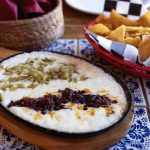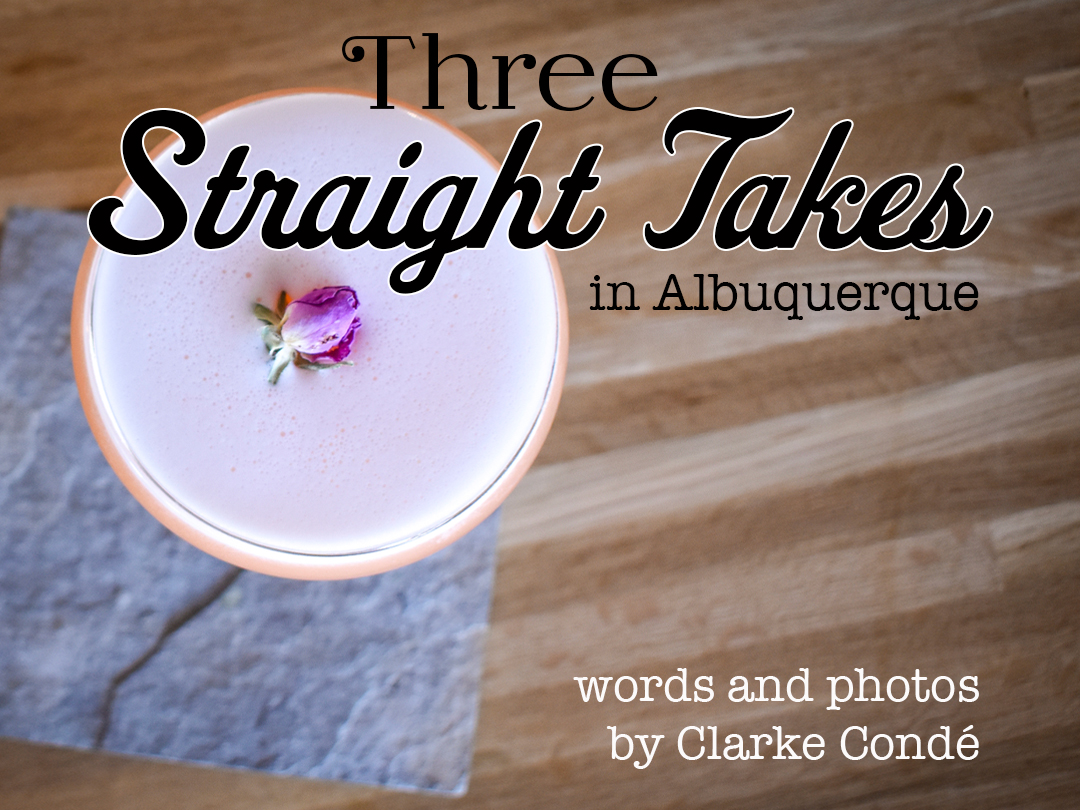
When crafting a mocktail, you can simply subtract the alcohol from the original cocktail, substitute that alcohol for something else, or rethink the premise entirely. Ryan Brown, owner of Lost Cultures Tea Bar in the Sawmill District, takes the latter approach. To him, it’s not only the drink but the environment in which it’s served and our perspectives on drinking that require rethinking. He fundamentally believes we should rethink our intake in general, and his contribution is on the beverage front, be it via tea, kombucha, or nonalcoholic cocktails.
I wanted to start by getting the terms straight. “There’s probably a group of people that don’t like the word ‘mocktails,’” Brown told me on a quiet Sunday morning at Lost Cultures. “They think maybe the word ‘mock’ takes away from the actual craft of it, but I think that phrase has been around for long enough that it’s not really going anywhere, and people identify with it.” That said, he prefers the term “NA cocktail.” Others I’ve come across include the technical “zero-proof,” the disused “virgin,” and the downright Victorian “temperance.” (For the record, I began this story in the camp with those who believe “mock” is pejorative, but was open to convincing.)
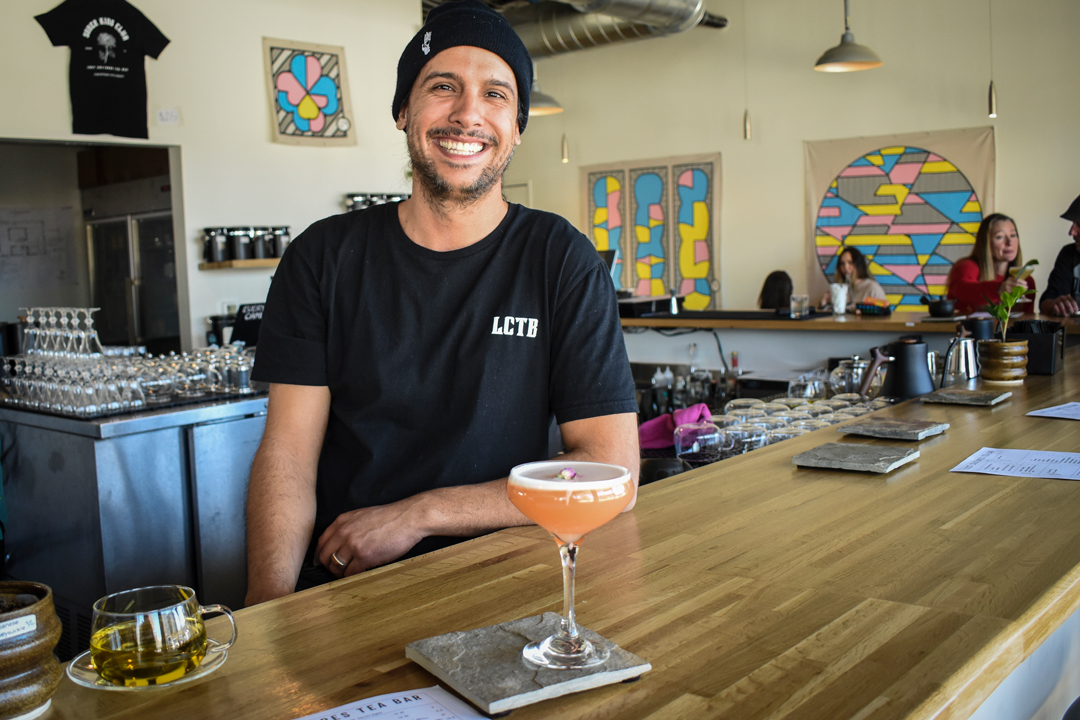
A longtime bartender, Brown wanted to craft nonalcoholic beverages and honor tea makers, but also create a safe space for nondrinkers. What sets the place apart from a bar is not simply the lack of alcohol but the low-key and multigenerational vibe. Lost Cultures is calm, clean, and contemporary, the walls and bar in soft whites, stainless steel, and light woods. Local pottery holding tiny sprouts dot the counter. Geometric abstract paintings in bright pastels line the walls. The music is upbeat without being distracting, setting the tone for a quiet conversation or time spent with a good book.
Essentially, Lost Cultures is to other places offering mocktails what a vegetarian restaurant is to one with a few meat-free dishes on its menu. (Incidentally, the place is also vegan, further giving it a rare distinction in Albuquerque.) The drinks themselves, nonalcoholic beverages prepared with house-made simple syrups and fresh-pressed juices, are created not simply to mimic or evoke classic cocktails but to be originals. Lost Cultures is steeped in an ethos of sobriety as a safe space for those who are on a path that does not include alcohol, whether for an afternoon or a lifetime. As Fugazi’s Ian MacKaye summed up the difference, “I don’t choose to be straight, I choose not to be the other thing.”
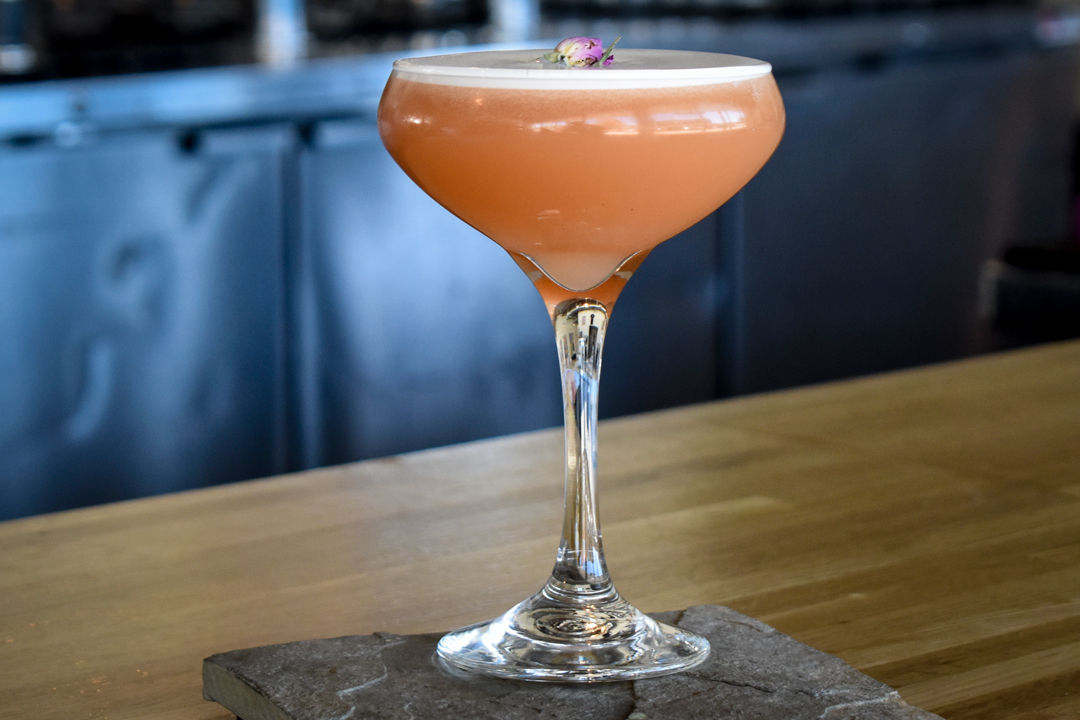
Brown recommended I try a Smokey Rose. “The Smokey Rose drink I used to make when I was still drinking,” he said. “I used to really like mezcal, so when I found this tea, I was like, wow, that has that same smoky essence as a mezcal.” It’s the smoked lapsang souchong tea that brings that flavor, and along with the grapefruit, lemon, and bitters, it makes for a truly unique creation.
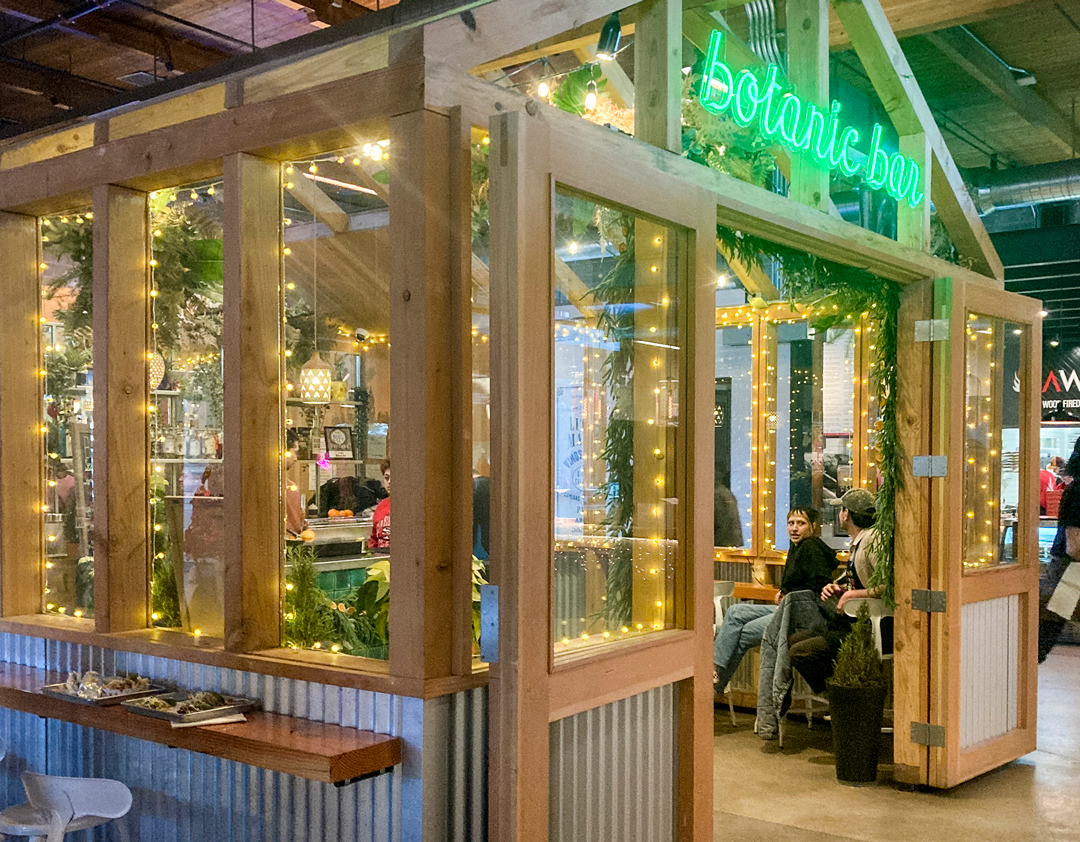
A short walk from Lost Cultures is Albuquerque’s Sawmill Market, a fitting place to drink a mocktail like the one I soon discovered at Botanic Bar.
Sawmill’s food hall concept provides its own version of a safe space by offering a reliable recommendation for tourists and others looking for a low-effort, crowd-pleasing outing. Aside from its manifold dining options, the space offers a variety of free-range seating to accommodate both large groups and intimate conversations.
Botanic Bar itself goes heavy on the Magnolia Market vibe to effectively transport customers to a reality outside the food hall. It’s a smallish location with a full bar designed for walk-up ordering, not unlike an Orange Julius, though there are a handful of stools on the interior and exterior of their greenhouse-inspired structure. It’s a perfect spot to find a Blueberry Fauxjito on a winter afternoon.
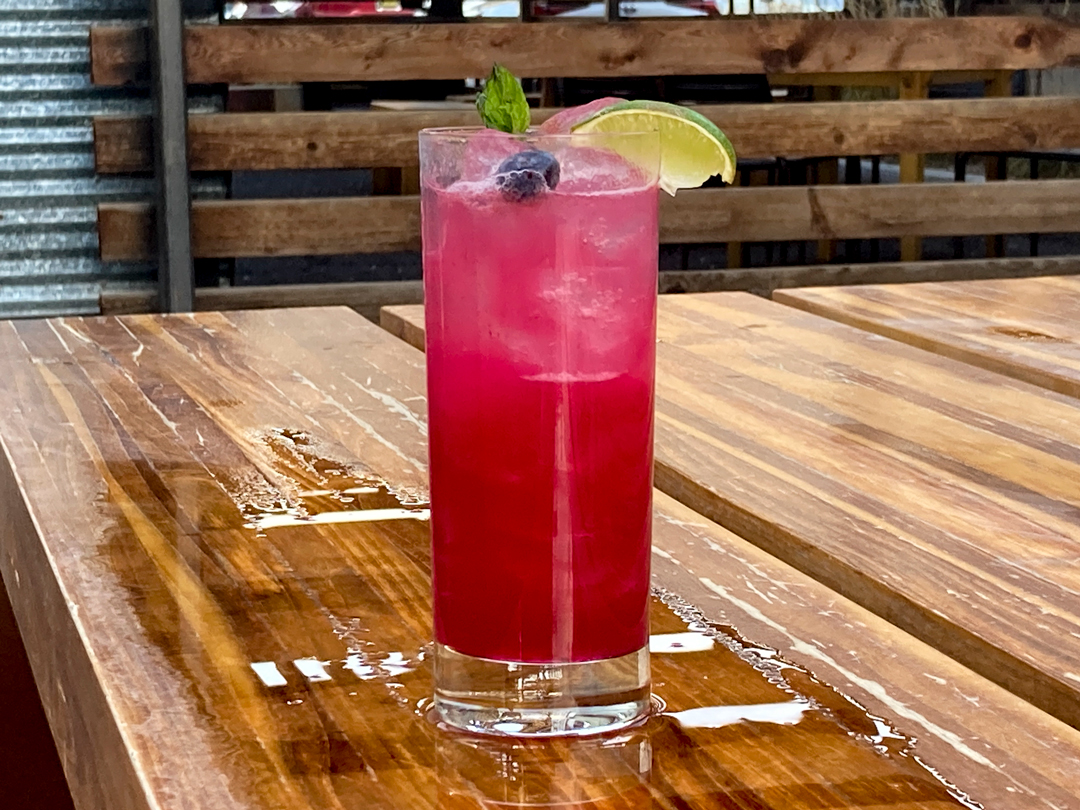
The bartender asked if I preferred sweet or sour, and I opted for sour, but the result was sweet enough that I wouldn’t have wanted to go the other way. Blueberry simple syrup, soda water, lime, and mint merge in a cocktail shaker to make this mocktail, a drink based on subtraction rather than substitution. With nothing to substitute the rum normally found in a mojito, the flavor profile would seem a bit skewed if you had your heart set on a mojito replacement, but the blueberry delivered a punch that stood on its own. Botanic Bar’s Blueberry Fauxjito is a mocktail suitable for those looking for a drink that does not feel the need to mimic its boozy brethren.
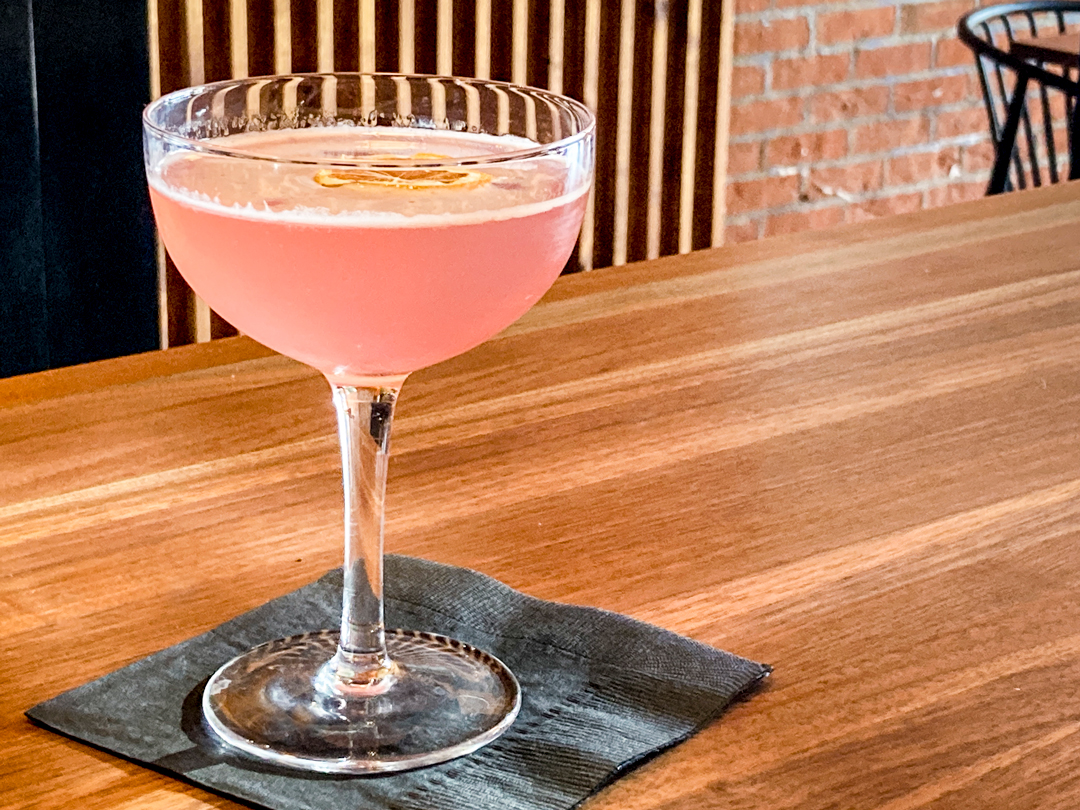
Located in Nob Hill next to Frenchish, Urban Hotdog Company occupies a newly remodeled brick-lined space. The high-end hot dogs they serve are the attraction, and the family-friendly tone provides a niche space where a bunch of dads can get together, bring their kids to watch football on the big TVs, and drink local craft beers without feeling like they’ve crossed the line by bringing their kids to a bar. That said, they do have a full bar, and a bit of space on the menu is reserved for nonalcoholic cocktails under the heading “None of the Booze, All of the Fun,” which is what brought me in on a Saturday afternoon.
The fun I sought was the Cosmo-Not. This straightforward take on the Cosmo substitutes the citrus-forward nonalcoholic spirit Seedlip Grove 42 for the orange notes of Cointreau. Well balanced and served in a coupe glass, it veered toward the blood orange side of the Cosmo continuum, with a decidedly frothy character and a slice of blood orange floating on top. To my way of thinking, a martini glass would have completed the effect, but glassware aside, if you’re seeking a booze-free Cosmo replica, this will not disappoint.
Having made peace with the term myself, I choose to see how the mocktail can suggest the original, or turn away from mimicry by introducing new flavors through the bartender’s craft. In the right hands, there are endless variations truly worth exploring, as these three places have done. And as what has become a young and popular scene evolves in Albuquerque, the talented barkeeps and entrepreneurs throughout the city are sure to find fresh ways to serve up nonalcoholic drinks for the duration of 2024.

Clarke Condé
Clarke Condé is a veteran food photographer and writer based in Roswell with a strong preference for red chile, keto-friendly beverages, and natural lighting. Find him on Instagram @clarkehere.


